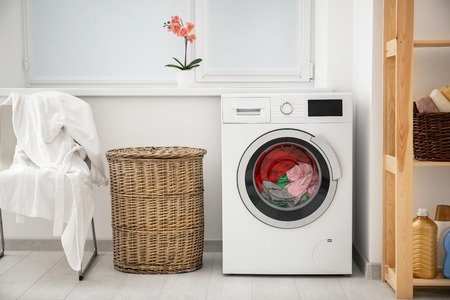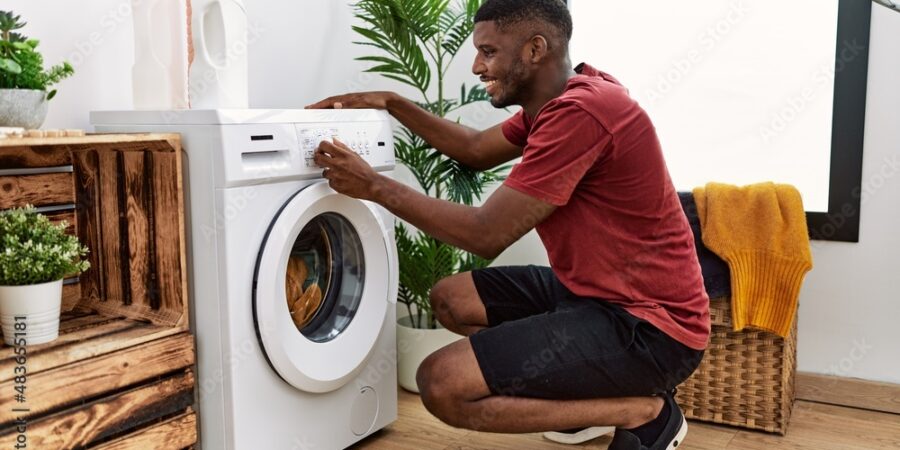Washing machines have become indispensable household appliances, saving us countless hours and effort on laundry day. If you are looking to purchase a new one, it is important to understand their price variations in other to secure the best deal. This buyer’s guide unravels the factors influencing the price of washing machines, helping you make a smart purchase.

Contents Highlight
What to Look Out for When Buying a Washing Machine in Nigeria?
As technology advances, washing machines are constantly evolving with newer features designed to make laundry easier and more efficient.

Renowned brands like LG, Samsung, Haier, Panasonic, and Midea are at the forefront of this innovation, offering a vast selection of washing machines with distinct features and at various price points to appeal to different categories of buyers.
From basic models with essential functions to advanced machines equipped with the latest technology, these brands are making washing machines available to suit diverse needs and budgets.
However, with various available options, it can be quite confusing to purchase the right washing machine that suits your needs, be it an individual or a family.
I have compiled a list of important things to consider when buying a washing machine in Nigeria.
1. Load Capacity
When it comes to load capacity, it’s essential to consider the size of your household. For larger families, a washing machine with a higher load capacity is recommended.
Not only does it allow you to wash more clothes in a single cycle, but it also prevents overcrowding and ensures your garments have enough space to move freely within the drum.
On the other hand, smaller households may find a machine with a lower load capacity more suitable. By aligning the load capacity with your family size, you can maximize efficiency and practicality, ensuring that your washing machine meets your specific laundry needs.
2. Type of Machine
Carefully consider the different types of washing machines available. The automatic and semi-automatic (twin-tub) models, as well as top-loaders and front-loaders.
Automatic models are convenient as they handle the entire wash process but cost more. Semi-automatics require manual effort in filling/draining water and transferring clothes, making them budget-friendly.
Top-loaders provide easy access for loading/unloading but use more water. Front loaders are energy-efficient, gentle on fabrics, and have higher spin speeds to reduce drying time, but are pricier.
The type you choose should align with your specific household needs for optimum satisfaction.
3. Features and Functionality
When buying a new washing machine, you should carefully evaluate the available wash cycles to ensure they suit your laundering needs, such as having a delicate cycle for gentle fabrics and a heavy-duty cycle for tough stains and soiled garments.
Another important factor is the spin speed, as higher spin speeds remove more water from clothes during the spin cycle, reducing drying time.
Additionally, you may want to consider advanced features like inverter technology for energy efficiency, smart connectivity for remote operation and monitoring, or a washer/dryer combo unit to save space in smaller laundry areas.
Assessing your specific needs and weighing the various feature options can help you select the most suitable washing machine.
4. Water Consumption
Considering the water consumption of the machine is especially important if you live in an area with water scarcity or high water rates. Front-loaders and machines with eco-wash cycles tend to use less water.
5. In-built Heaters
One of the advantages of certain washing machine models is the inclusion of in-built heaters.
These heaters allow the machine to efficiently heat the water to the desired temperature, which can be particularly beneficial for tackling tough stains and deeply ingrained dirt.
By raising the water temperature, the in-built heaters enhance the cleaning power of the machine, making it easier to remove stubborn stains and grime that may not come out with cooler water temperatures.
6. Energy Efficiency
It is essential to consider models that offer superior water and energy efficiency. A wise decision would be to opt for machines that have earned a 4- or 5-star energy rating, as these ratings indicate compliance with strict efficiency standards and a high level of resource conservation.
By making this thoughtful selection, you not only position yourself to reap long-term financial savings through reduced utility costs but also contribute to environmentally sustainable practices by minimizing resource consumption.
7. Brand and Warranty
When buying a washing machine, pay close attention to the brand and warranty. Go for well-known, reputable brands that have a good track record for quality and durability in Nigeria. This will ensure you get a reliable machine that lasts.
Also, carefully compare the warranty terms offered by different brands. A longer and more comprehensive warranty protects you from unexpected repair costs if something goes wrong with the machine.
8. Budget
Top-loading models offer an economical option with adequate features for efficient laundry care. Look for spacious drums, multiple wash cycles, and energy-saving modes.
Those with more flexibility in their budget should consider investing in a front-loading washing machine for additional features, larger capacities, and improved water/energy efficiency which can save on utility costs long-term.
Regardless of the type chosen, balance your budget with your specific laundry needs like household size, washing frequency, and fabric care needs to determine the right capacity and desired features. Compare energy ratings, warranties, and overall value across brands and models within your budget range.
Carefully consider the different types of washing machines available and choose one that will suit your needs and budget, as the price of washing machines can vary greatly.
Price of Washing Machines in Nigeria: FAQs
#1. What is the Price of Washing Machines in Nigeria?
The price of washing machines in Nigeria varies widely, with basic models starting around ₦150,000 and high-end machines with advanced features and larger capacities costing up to ₦1,000,000 or more.
Hisense 5kg Top Load costs about ₦136,000, Front Loader Automatic Washing Machine price sits between ₦ 360,000 to ₦ 550,000 in Nigerian Naira (NGN). You can check out the prices as well on popular online shopping platforms like 9jalist and Jumia.
The price depends on factors such as the size of the machine, the type (automatic or semi-automatic, front-loading or top-loading), the features included, and the brand.
Generally, larger machines with more advanced features from premium brands tend to be more expensive, while smaller, simpler models from lesser-known brands are more affordable.
#2. Where Can I Buy a Washing Machine in Nigeria?
Washing machines can be purchased through major electronics showrooms, independent appliance stores, or online marketplaces.
When purchasing a washing machine, it’s advisable to research different models, compare prices, read reviews, and consider factors like capacity, energy efficiency, and warranties to secure the best deal.
#3. Which Type of Washing Machine is Best for Home Use?
Front-load washing machines are generally considered the best for home use due to their water and energy efficiency, larger capacity, and gentler treatment of clothes.
#4. Which Type of Washing Machine is More Efficient?
Front-loading washing machines usually use less water and electricity than top-loading ones. This is because of how they are designed and how they wash clothes. Front-loaders with the ENERGY STAR label can use up to 50% less electricity and 45% less water compared to top-loaders.
What Maintenance is Needed for a Washing Machine?
To keep your washing machine working well for a long time, proper care and maintenance are very important. Following these simple tips will help keep your machine in great condition:
- Clean the lint filter after every wash to prevent clogs and allow proper drainage.
- Wipe down the outside of the machine monthly using a mild cleaning solution to keep it looking fresh.
- Check the water hoses for any cracks, wear, or leaks, and replace them if needed.
- Clean the rubber door seal regularly to remove dirt, mildew, or odours.
- Run a hot water cycle with vinegar or a washing machine cleaner every few months to flush out any built-up residue or limescale.
- Check the drain pump filter for any blockages or clogs that could prevent proper draining.
- Select the right settings for each load, such as water temperature, cycle type, and spin speed, based on the fabrics you’re washing.
- Unplug the machine if you won’t be using it for an extended period, like when you’re away on vacation.
- Use the recommended amounts of detergent and fabric softener – too much can cause problems.
- Ensure the water pressure is within the correct range, as too high or too low pressure can affect the machine’s performance.
Conclusion
Finding the right washing machine in Nigeria requires balancing your budget and laundry needs.
The price of washing machines can vary a lot depending on the brand, size, features, and where you buy from.
While cheaper options from local brands or used machines are available, investing in a quality washing machine from a well-known brand can save you money in the long run through better energy and water efficiency, as well as fewer repairs.
With careful consideration, you can find a washing machine that meets your needs and provides good value for your money.
With so many factors to consider when purchasing a washing machine in Nigeria, share your own experiences and insights by leaving a comment that could help guide others toward making the best choice!

